同义短语同义句
初中英语语法——句型转换之同义句
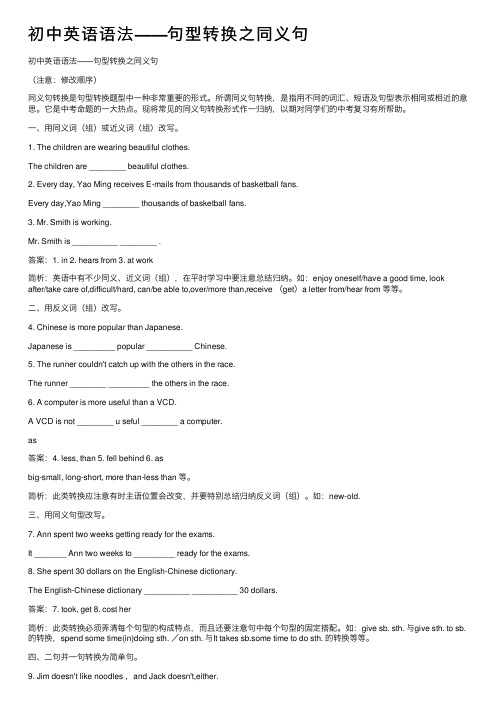
初中英语语法——句型转换之同义句初中英语语法——句型转换之同义句(注意:修改顺序)同义句转换是句型转换题型中⼀种⾮常重要的形式。
所谓同义句转换,是指⽤不同的词汇、短语及句型表⽰相同或相近的意思。
它是中考命题的⼀⼤热点。
现将常见的同义句转换形式作⼀归纳,以期对同学们的中考复习有所帮助。
⼀、⽤同义词(组)或近义词(组)改写。
1. The children are wearing beautiful clothes.The children are ________ beautiful clothes.2. Every day, Yao Ming receives E-mails from thousands of basketball fans.Every day,Yao Ming ________ thousands of basketball fans.3. Mr. Smith is working.Mr. Smith is __________ ________ .答案:1. in 2. hears from 3. at work简析:英语中有不少同义、近义词(组),在平时学习中要注意总结归纳。
如:enjoy oneself/have a good time, look after/take care of,difficult/hard, can/be able to,over/more than,receive (get)a letter from/hear from 等等。
⼆、⽤反义词(组)改写。
4. Chinese is more popular than Japanese.Japanese is _________ popular __________ Chinese.5. The runner couldn't catch up with the others in the race.The runner ________ _________ the others in the race.6. A computer is more useful than a VCD.A VCD is not ________ u seful ________ a computer.as答案:4. less, than 5. fell behind 6. asbig-small, long-short, more than-less than 等。
四年级英语上册短语和同义句
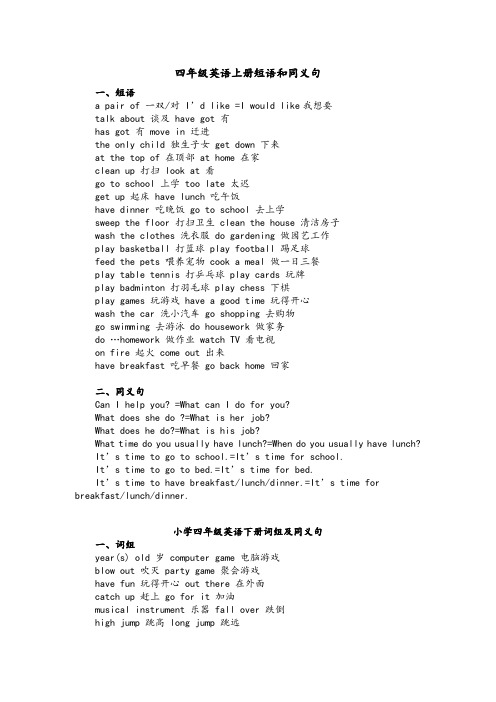
四年级英语上册短语和同义句一、短语a pair of 一双/对I’d like =I would like我想要talk about 谈及have got 有has got 有move in 迁进the only child 独生子女get down 下来at the top of 在顶部at home 在家clean up 打扫look at 看go to school 上学too late 太迟get up 起床have lunch 吃午饭have dinner 吃晚饭go to school 去上学sweep the floor 打扫卫生clean the house 清洁房子wash the clothes 洗衣服do gardening 做园艺工作play basketball 打篮球play football 踢足球feed the pets 喂养宠物cook a meal 做一日三餐play table tennis 打乒乓球play cards 玩牌play badminton 打羽毛球play chess 下棋play games 玩游戏have a good time 玩得开心wash the car 洗小汽车go shopping 去购物go swimming 去游泳do housework 做家务do …homework 做作业watch TV 看电视on fire 起火come out 出来have breakfast 吃早餐go back home 回家二、同义句Can I help you? =What can I do for you?What does she do ?=What is her job?What does he do?=What is his job?What time do you usually have lunch?=When do you usually have lunch?It’s time to go to school.=It’s time for school.It’s time to go to bed.=It’s time fo r bed.It’s time to have breakfast/lunch/dinner.=It’s time forbreakfast/lunch/dinner.小学四年级英语下册词组及同义句一、词组year(s) old 岁computer game 电脑游戏blow out 吹灭party game 聚会游戏have fun 玩得开心out there 在外面catch up 赶上go for it 加油musical instrument 乐器fall over 跌倒high jump 跳高long jump 跳远table tennis 乒乓球be good at 擅长well done 做得好Olympic game 奥运会turn on 打开rice noodles 米粉Chinese cabbage 白菜main course 主吃ice cream 冰淇淋holiday photo 假日照片ball game 球类游戏so young 那么年青so much 非常old person 老人watch TV 看电视happy birthday 生日快乐best friend 好朋友good friend 好朋友play guitar 弹吉它school uniform, 校服good idea 好主意tell story, 讲故事look at… 看…… listen to… 听……..play football 踢足球play basketball 打篮球play badminton 打羽毛球play table tennis 打乒乓球have breakfast 吃早餐have lunch 吃午餐have dinner 吃晚餐orange juice 橙汁apple juice 苹果汁a piece of… 一片…..a bowl of… 一碗…. a bottle of… 一瓶…..a cup of… 一杯…… a plate of.. 一碟…..a glass of… 一杯…… a box of… 一盒…..a bag of… 一袋fried rice 炒饭fried egg 煎蛋fried noodles 炒面of course 当然no problem 没问题roast beef 烤牛肉串Chinese cabbage soup 白菜汤tomato soup 西红柿汤half a kilo 一斤look good 看起来好的have for dinner 晚餐吃…..have for breakfast 早餐吃……. have for lunch 午餐吃….. anything else 别的need to… 需要…二、同义句1.What does he/she do ?What’s his/her job ?2.My name is Ben.I’m Ben.3.There is a bed in my room.My room has a bed.4. He is tall.He isn’t short.5. My favourite sport is running.I Like running best.6. My favourite colour is green.I Like green best.7. What’s wrong?What’s the matter?8. Nothing for me.I don’t want anything.9. Can I help you?What can I do for you?10. How much is/are it/they? How much does/do it/they cost。
小学英语同义句

小学英语同义句(共2页)--本页仅作为文档封面,使用时请直接删除即可----内页可以根据需求调整合适字体及大小--小学英语同义句1. What’s the time What time is it2. My name is Tom. I’m Tom.3. How old are you What’s your age4. What’s your father What’s your father’s job5. It’s time for lunch. It’s time to have lunch.6. What’s the weather like in spring How is the weather in spring7. I like Enghish best. My favourite subject is English.8. Tom is taller than Jack. Jack is shorter than Tom.9. Do you want to go swimming Would you like to go swimming10. What date is it today What’s the date today11. It’s often rainy in spring in Jiangsu. It often rains in spring in Jiangsu.12. I go to school by bus. I take a bus to school. I go to school in the bus.13. He is good at playing football. He does well in playing football.14. Those are their watches. Those watches are theirs.15. How about you What about you16. What’s wrong with you What’s the matter17. School is over. Clesses are over.18. Please give (show) me a book. Please give (show) a book to me.19. We are not in the same school. We are in different school.20. Mr Wang is from China. Mr Wang comes from China.21. She is going to do her homework. She will do her homework.22. He doesn’t have any brothers or sisters. He is the only child in his family.23. What’s the name of the boy What’s the boy’s name24. I’m busy. I’m not free.25. We shouldn’t walk on the grass. We should keep off the grass.26. They were there a moment ago. They were there just now.27. Whose book is it Whose is it book28. It means”No littering” . It means we should not litter.29. They are having a chat. They are chating.30. Can you tell me the way to the zoo How can I get to the zooWhere is the zoo Will you tell me the way to the zoo31. Thank you. Thank you a lot. Thanks. Thank you very much.32. That’s all right. Not at all. You are welcome.is not as tall as Mike . Tom is shorter than Mike .doesn’t run faster than Mike . Tom doesn’t run as fast as Mike .Tom runs slower than Mike .35.I am on your left. You are on my right.doesn’t run as fast as Jim. Tom runs slower than Jim.2同义短语Too also be good at do well inBoth all come from be fromWant would like have school go to school Go for a walk take a walk join take part in Just now a moment ago Much many a lot of Beside near lots ofLook for find Put on wear3。
初中英语同义句归纳
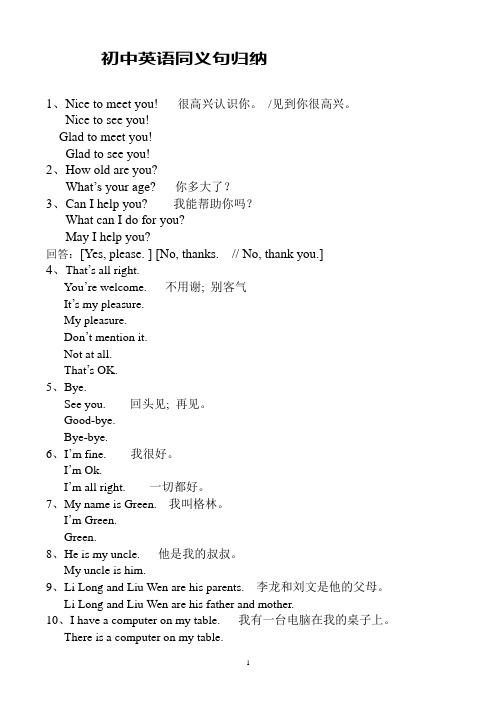
初中英语同义句归纳1、Nice to meet you! 很高兴认识你。
/见到你很高兴。
Nice to see you!Glad to meet you!Glad to see you!2、How old are you?What’s your age?你多大了?3、Can I help you? 我能帮助你吗?What can I do for you?May I help you?回答:[Yes, please. ] [No, thanks. // No, thank you.]4、That’s all right.You’re welcome. 不用谢; 别客气It’s my pleasure.My pleasure.Don’t mention it.Not at all.That’s OK.5、Bye.See you. 回头见; 再见。
Good-bye.Bye-bye.6、I’m fine. 我很好。
I’m Ok.I’m all right. 一切都好。
7、My name is Green. 我叫格林。
I’m Green.Green.8、He is my uncle. 他是我的叔叔。
My uncle is him.9、Li Long and Liu Wen are his parents. 李龙和刘文是他的父母。
Li Long and Liu Wen are his father and mother.10、I have a computer on my table. 我有一台电脑在我的桌子上。
There is a computer on my table.11、My parents are at home. 我的父母都在家里。
My father and mother are at home.12、Jim sits on Mary’s left. 吉姆坐在玛丽的左侧。
Jim sits next to Mary.13、A week has seven days. 一个星期有七天。
初中英语经典短语及同义词组

初中英语同义词组1.arrive in/at=get to=reach2.be fine=be well=be OK3.be from=come from4.be in=be at home5.be full of=be filled with6.be late for=come late for7.be on a visit to= visit8.be able to=can9.be away=be out10.be busy doing sth.=be busy with sth.11.be pleased=be glad=be happy12.buy sb. Sth.=buy sth. to sb13.be up=get up14.catch up with=keep up with15.catch a bus=take a bus16.catch a cold=have a colde into=step intoe on=come alonge down=get down20.do well in=be good at21.do the shopping=go shopping22.drop off=get off23.enjoy doing sth.=like doing sth.24.have a good time=enjoy oneself25.fall down=fall off26.get the telephone=answer the telephone27.give sb.sth.=give sth.to sb.28.give sb.the message=give the message to sb.29.give sb. a talk=give a talk to sb.30.give a concert=have a concert31.get on well with sb.=be good to32.give…a call=give…a ring33.go down=go along34.go for a swim=go swimming35.go on doing sth.=go on with sth.36.go up=go along37.go to sleep=get to sleep=fall asleep38.have a look (at)=look at39.have a swim=go swimming40.have got=have41.hear from=receive a letter from=have a letter from=get a letter from42.help sb with sth=help sb to do sth43.hold a meeting=have a meeting44.hold on=wait a minute45.hurry up=be quick46.knock at=knock onst from…to=be from…to48.like doing sth=like to do sth49.look out=be careful50.love to do sth=like to do sth51.make up one’s mind to do=set one’s mind to do52.pay for=spend on53.prefer…to=like b etter than54.ring up=call sb55.send for sb=ask sb to come56.show sb sth=show sth to sb57.take care of=look after58.take exercise=do sport59.take a message=leave a message60.think about=think of61.teach oneself=learn all by oneself62.turn off=turn down63.turn right at the…crossing=take the …turning on the right64.walk on=go on65.walk to=go to …on foot66.walk along=go along67.at school=in the school68.a lot of=lots of69.a lot=very much70.a quarter past two=two fifteen71.at times=sometimes72.at last=in the end=finally73.a bit=a little=a few74.a moment ago=just now75.at once=right now76.at noon=in the middle of a day77.at that moment=at that time=just then78.at the moment=at the same time79.at the doctor’s=in the doctor’s office80.all over the world=across the world=around the world=in the world81.a moment later=later on82.after a while=a moment later83.all the same=all the time84.as soon as possible=as quick as possible85.in line=in a queue86.in the southern part of=in the south of87.in the day=in the daytime88.much of China=many places of China89.more than=over90.no longer=not…any longer=no more=not any more91.not far from=near to92.North China=the north of China93.of course=certainly94.plenty of=quite a few=a lot of=lots of=large number of=a great many of=a good deal of95.two and a half years=two years and a half初中英语同义词组1. arrive in/at=get to=reachI arrived at the airport at 10.=I reach the airport at 10.注意这里不能用arrive in2. be fine=be well=be OKI’m fine=I’m well.=I’m OK.3. be from=come fromHe is from China.=He comes from China.4. be in=be at homeHe is in.=He is at home.同理:be out= be not at home5. be full of=be filled withThe bottle is full of orange.=The bottle is filled with orange.6. be late for=come late forI’m sorry, I’m late for the meeting.=I’m sorry, I come late for the meeting.7. be on a visit to= visitHe is on a visit to China.= He is visiting China8. be able to=canHe was able to ride a bike at the age of 5.=He could ride a bike when he was 5.9. be away=be out=be not at home10. be busy doing sth.=be busy with sth.He is busy doing his homework.=He is busy with his homework.11. be pleased=be glad=be happyThe coach was pleased with their performance.=The coach was glad with their performance.=The coach was happy with their performance.12. buy sb. Sth.=buy sth. to sbMy mother bought me a book.=My mother bought a book to me.13. be up=get upBe up, Tom!=Get up, Tom.14. catch up with=keep up withI can catch up with others.=I can keep up with others.15. catch a bus=take a busCan I catch a bus?/Can I take a bus?16. catch a cold=have a coldOh, no! You’ve caught a cold.=Oh, no! You’ve had a cold.17. come into=step intoHe came into the classroom.=He stepped into the classroom18. come down=get downCome down! That’s dangerous.=Get down! That’s dangerous.19. do well in=be good atHe does well in swimming.=He is good at swimming.20. do the shopping=go shoppingI’ll do the shopping.=I’ll go shopping.21. drop off=get off22. enjoy doing sth.=like doing sth.I enjoy reading.=I like reading.23. have a good time=enjoy oneselfWe had a good time at the party.=We enjoyed ourselves at the party.24. fall down=fall offI fell down.=I fell off the bike.25. get the telephone=answer the telephoneI got the telephone.= I answered the telephone.26. give sb.sth.=give sth.to sb.27. give sb.the message=give the message to sb.28. give sb. a talk=give a talk to sb.29. give a concert=have a concertThey gave a concert.=They had a concert.30. get on well with sb.=be good toI got on well with my neighbors=I’m good to my neighbors.31. give…a call=give…a ringI gave a call to you.=I give you a ring.32. go down=go along33. go for a swim=go swimming34. go on doing sth.=go on with sth.35. go up=go along36. go to sleep=get to sleep=fall asleep37. have a look (at)=look at38. have a swim=go swimming39. have got=have40. hear from=receive a letter from=have a letter from=get a letter from41. help sb with sth=help sb to do sth42. hold a meeting=have a meeting43. hold on=wait a minute44. hurry up=be quick45. knock at=knock on46. last from…to=be from…to47. like doing sth=like to do sth48. look out=be careful49. love to do sth=like to do sth50. make up one’s mind to do=set one’s mind to do51. pay for=spend on52. prefer…to=like better than53. ring up=call sb54. send for sb=ask sb to come55. show sb sth=show sth to sb56. take care of=look after57. take exercise=do sport58. take a message=leave a message59. think about=think of60. teach oneself=learn all by oneself61. turn off=turn down62. turn right at the…crossing=take the …turning on the right63. walk on=go on64. walk to=go to …on foot65. walk along=go along66. at school=in the school67. a lot of=lots of68. a lot=very much69. a quarter past two=two fifteen70. at times=sometimes71. at last=in the end=finally72. a bit=a little=a few73. a moment ago=just now74. at once=right now75. at noon=in the middle of a day76. at that moment=at that time=just then77. at the moment=at the same time78. at the doctor’s=in the doctor’s office79. all over the world=across the world=around the world=in the world80. a moment later=later on81. after a while=a moment later82. all the same=all the time83. as soon as possible=as quick as possible84. in line=in a queue85. in the southern part of=in the south of86. in the day=in the daytime87. much of China=many places of China88. more than=over89. no longer=not…any longer=no more=not any more90. not far from=near to91. North China=the north of China92. of course=certainly93. plenty of=quite a few=a lot of=lots of=large number of=a great many of=a good deal of94. two and a half years=two years and a halfthink up=come up withgive out=hand outuse up=run out ofcall up=ring upinstead of=in place oftake after=likeset up=eatablishbe angry with=be mad oflose one's way=get losetry one's best=do one's bestgo to sleep=get to sleep=fall asleepin the end=at last=finally=at the end ofmake a decision=decide to dobe surprise at=be amazed ateven thought=even ifno long=not...any longertake pride in=be pround ofgive up=stop doingworry about=be worried aboutbe confident of doing=have confidence in doingnot....in the slightest=not at allplenty of=lots of=a lot ofget along with=get on withbe anxious about=be worried abouton diaplay=on showwhatever=no matter whatexpect sb. to do=wish sb.to dostay away from=keep away fromconsider doing=think about doingcontinue doing=go on dingtake after=be similar tobe filled with=be full ofat once=right awaydonate...to=give away...tobe used for=be used to doby accident=be chance同义句转换训练是初中英语学习的重点,也是学生学习的难点,同义句转换虽不是中考的专题了,但它可以出现在听力测试、选择题、写作中。
六级同义替换总结
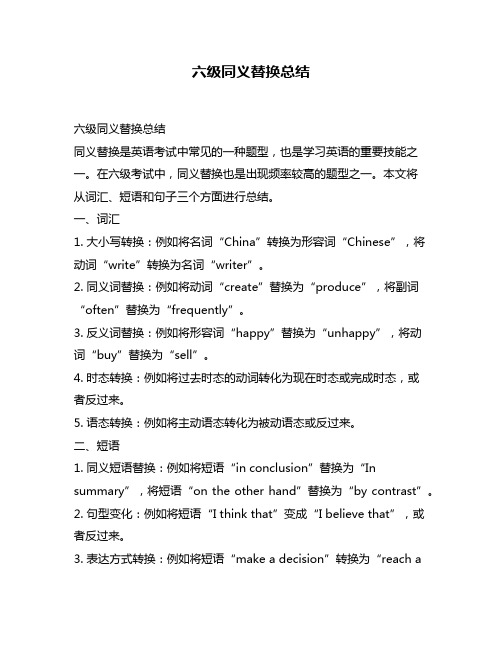
六级同义替换总结六级同义替换总结同义替换是英语考试中常见的一种题型,也是学习英语的重要技能之一。
在六级考试中,同义替换也是出现频率较高的题型之一。
本文将从词汇、短语和句子三个方面进行总结。
一、词汇1. 大小写转换:例如将名词“China”转换为形容词“Chinese”,将动词“write”转换为名词“writer”。
2. 同义词替换:例如将动词“create”替换为“produce”,将副词“often”替换为“frequently”。
3. 反义词替换:例如将形容词“happy”替换为“unhappy”,将动词“buy”替换为“sell”。
4. 时态转换:例如将过去时态的动词转化为现在时态或完成时态,或者反过来。
5. 语态转换:例如将主动语态转化为被动语态或反过来。
二、短语1. 同义短语替换:例如将短语“in conclusion”替换为“In summary”,将短语“on the other hand”替换为“by contrast”。
2. 句型变化:例如将短语“I think that”变成“I believe that”,或者反过来。
3. 表达方式转换:例如将短语“make a decision”转换为“reach adecision”,将短语“take into account”转换为“consider”。
三、句子1. 同义句替换:例如将原句“I am not interested in politics”替换为“I have no interest in politics”。
2. 反义句替换:例如将原句“The weather is good today”替换为“The weather is bad today”。
3. 并列句变化:例如将原句“He is tall and handsome”变成“He is both tall and handsome”。
4. 从句变化:例如将原句“I will go to the party if I have time”变成“If I have time, I will go to the party”。
初中英语同义单词与短语汇总(适用于同义句转换与综合阅读题型)
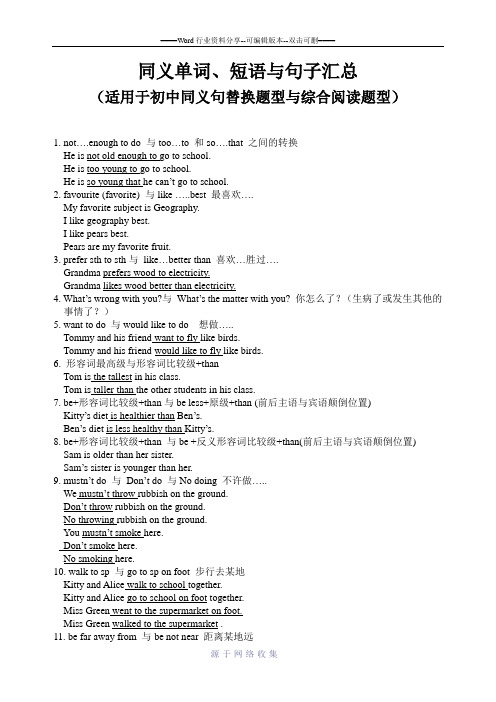
同义单词、短语与句子汇总(适用于初中同义句替换题型与综合阅读题型)1. not….enough to do 与too…to 和so….that 之间的转换He is not old enough to go to school.He is too young to go to school.He is so young that he can’t go to school.2. favourite (favorite) 与like …..best 最喜欢….My favorite subject is Geography.I like geography best.I like pears best.Pears are my favorite fruit.3. prefer sth to sth与like…better than 喜欢…胜过….Grandma prefers wood to electricity.Grandma likes wood better than electricity.4. What’s wrong with you?与What’s the matter with you? 你怎么了?(生病了或发生其他的事情了?)5. want to do 与would like to do 想做…..Tommy and his friend want to fly like birds.Tommy and his friend would like to fly like birds.6. 形容词最高级与形容词比较级+thanTom is the tallest in his class.Tom is taller than the other students in his class.7. be+形容词比较级+than与be less+原级+than (前后主语与宾语颠倒位置)Kitty’s diet is healthier than Ben’s.Ben’s diet is less healthy than Kitty’s.8. be+形容词比较级+than 与be +反义形容词比较级+than(前后主语与宾语颠倒位置) Sam is older than her sister.Sam’s sister is younger than her.9. mustn’t do 与Don’t do 与No doing 不许做…..We mustn’t throw rubbish on the ground.Don’t throw rubbish on the ground.No throwing rubbish on the ground.You mustn’t smoke here.Don’t smoke here.No smoking here.10. walk to sp 与go to sp on foot 步行去某地Kitty and Alice walk to school together.Kitty and Alice go to school on foot together.Miss Green went to the supermarket on foot.Miss Green walked to the supermarket .11. be far away from 与be not near 距离某地远Beijing is far away from Shanghai.Beijing isn’t near Shanghai.12. arrive at (+小地点)/ in(+大地点)与reach 与get to (到达某地)My uncle arrived at the airport on time.My uncle reached the airport on time.My uncle got to the airport on time.13. What job do you want to do? 与What do you want to be?你想做什么工作?14. How much +be + sth? 与How much +助动词+ sth cost? “…..多少钱”How much is the watch?How much does the watch cost?15. Let’s do 与Why not?/ Shall we do? (提出倡议时的句型)Let’s buy some chocolates.Why not buy some chocolates.Shall we buy some chocolates?16. no与not any 没有The students in our school did no exercises today because of the weather.The students in our school didn’t do any exercises today because of the weather.17. be less +形容词原级+ than与be not as ….as /be not so…as. “….不如….”V olleyball is less popular than football.V olleyball isn’t as/so popular as football.18. ………, too. 与both…and…Bob is good at Chemistry. Peter is good at Chemistry, too.Both Bob and Peter are good at Chemistry.…….., either. 与neither…nor…与both…and…Mary doesn’t like music. Tony doesn’t like music, either.Neither Mary nor Tony likes music.Both Mary and Tony don’t like music.19. be able to 与can/couldHe wasn’t able to sleep at night.He couldn’t sleep at night.20. give up 与stop 放弃,停止She gave up all her work for a while.She stopped all her work for a while.21. good 与fine ( 形容天气时)The weather was looking good.The weather was looking fine.22. more than 与over 多于…..More than 5000 Wushu lovers from all over the world came here.Over 5000 Wushu lovers from all over the world came here.23. famous 与well-known 著名的The most famous is Shao Lin boxing.The most well-known is Shao Lin boxing.24. Prevent sb (from) doing sth与stop sb (from) doing sth 阻止某人做某事We should prevent others (from) polluting the environment.We should stop others (from) polluting the environment.25. receive 与get. 收到He received a lot of gifts on his birthday.He got a lot of gifts on his birthday.26. stay +sp与live in + sp 呆在某地Roma should be free to stay France.Roma should be free to live in France.27. make up one’s mind 与decide 决定He has made up his mind.He has decided.28. describe 与explain 描述,解释More described a nice world in his Utopia.More explained a nice world in his Utopia.29. essential 与necessary 必要的Work is essential for every person.Work is necessary for every person.30. early 与ahead 提前They help the students have college on their minds early.They help the students have college on their minds ahead.31. finish school 与graduate 毕业We are going to make sure they finish school.We are going to make sure they graduate.32. reply 与answer 回答,答复We hope that he can give us a reply as soon as possible.We hope that he can give us a answer as soon as possible.33. all over the world与throughout the world/ around the world/ in the world全世界He became well-known all over the world.He became well-known throughout the world.34. difficult与hard 难的It’s as difficult as the college entrance examination.It’s as hard as the college entrance examination.35. perfect mark 与full mark 满分He got a perfect mark.He got a full mark.36. express 与show 展示It’s a way to express agreement.It’s a way to show agreement.37. no one 与nobodyNo one knows for sure.Nobody knows for sure.38. not any longer/more 与no longer /more不再He’s not here any longer./more.He’s no longer/more here.39. wish 与hope 希望He wishes to see me.He hopes to see me.40. a few 与several 一些41. feed 与support/ raise 养活China has to feed the most people in the world.China has to support the most people in the world.China has to raise the most people in the world.42. stronger 与more powerful 更强大China is becoming stronger than before.China is becoming more powerful than before.43. not possible 与impossible 不可能的It’s not possible to work out the problem in such a short time.It’s impossible to work out the problem in such a short time.44. have to 与mustThey have to wear their school uniform in school.They must wear their school uniform in school.45. join in 与take part in 参加He takes part in the activity on behalf of the class.He joins in the activity on behalf of the class.46. don’t agree 与disagree 不同意…They don’t agree with her.They disagree with her.47. turn on sth 与start sth 启动I took a deep breath and turned on the engine.I took a deep breath and started the engine.48. place 与put 放置The book is placed on the top of the bookshelf.The book is put on the top of the bookshelf.49. talk about 与discuss 讨论,谈论关于。
英语基础同义句
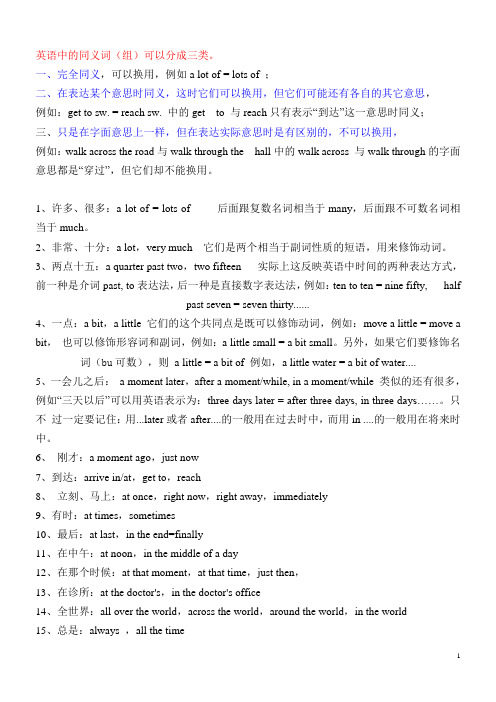
英语中的同义词(组)可以分成三类。
一、完全同义,可以换用,例如a lot of = lots of ;二、在表达某个意思时同义,这时它们可以换用,但它们可能还有各自的其它意思,例如:get to sw. = reach sw. 中的get to 与reach只有表示“到达”这一意思时同义;三、只是在字面意思上一样,但在表达实际意思时是有区别的,不可以换用,例如:walk across the road与walk through the hall中的walk across 与walk through的字面意思都是“穿过”,但它们却不能换用。
1、许多、很多:a lot of = lots of 后面跟复数名词相当于many,后面跟不可数名词相当于much。
2、非常、十分:a lot,very much 它们是两个相当于副词性质的短语,用来修饰动词。
3、两点十五:a quarter past two,two fifteen 实际上这反映英语中时间的两种表达方式,前一种是介词past, to表达法,后一种是直接数字表达法,例如:ten to ten = nine fifty, halfpast seven = seven thirty......4、一点:a bit,a little 它们的这个共同点是既可以修饰动词,例如:move a little = move a bit,也可以修饰形容词和副词,例如:a little small = a bit small。
另外,如果它们要修饰名词(bu可数),则 a little = a bit of 例如,a little water = a bit of water....5、一会儿之后:a moment later,after a moment/while, in a moment/while 类似的还有很多,例如“三天以后”可以用英语表示为:three days later = after three days, in three days……。
同义句转换口诀顺口溜
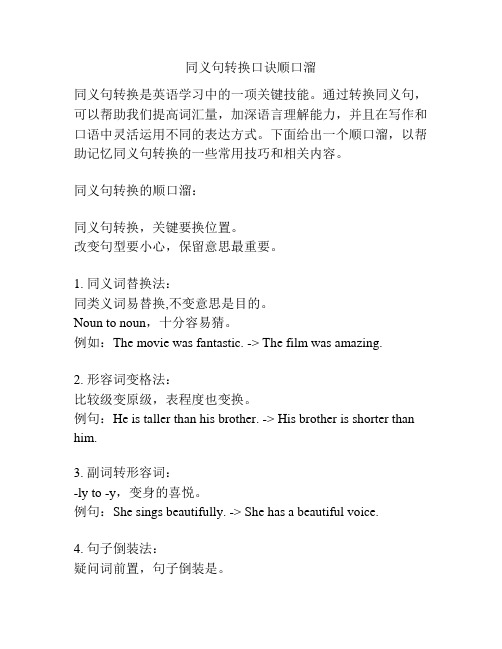
同义句转换口诀顺口溜同义句转换是英语学习中的一项关键技能。
通过转换同义句,可以帮助我们提高词汇量,加深语言理解能力,并且在写作和口语中灵活运用不同的表达方式。
下面给出一个顺口溜,以帮助记忆同义句转换的一些常用技巧和相关内容。
同义句转换的顺口溜:同义句转换,关键要换位置。
改变句型要小心,保留意思最重要。
1. 同义词替换法:同类义词易替换,不变意思是目的。
Noun to noun,十分容易猜。
例如:The movie was fantastic. -> The film was amazing.2. 形容词变格法:比较级变原级,表程度也变换。
例句:He is taller than his brother. -> His brother is shorter than him.3. 副词转形容词:-ly to -y,变身的喜悦。
例句:She sings beautifully. -> She has a beautiful voice.4. 句子倒装法:疑问词前置,句子倒装是。
例句:He has never been to Paris. -> Never has he been to Paris.5. 被动语态转换法:物主变主语,动作仍在继续。
例句:The book was written by J.K. Rowling. -> J.K. Rowling wrote the book.6. 名词转动词法:名词动化,行动的表达。
例句:She made a decision. -> She decided.7. 定语从句变定语短语:去掉关系词,剩下修饰。
例句:This is the girl who won the competition. -> This is the competition-winning girl.8. 同义短语替换法:意思互通,随心替换。
同义句转换
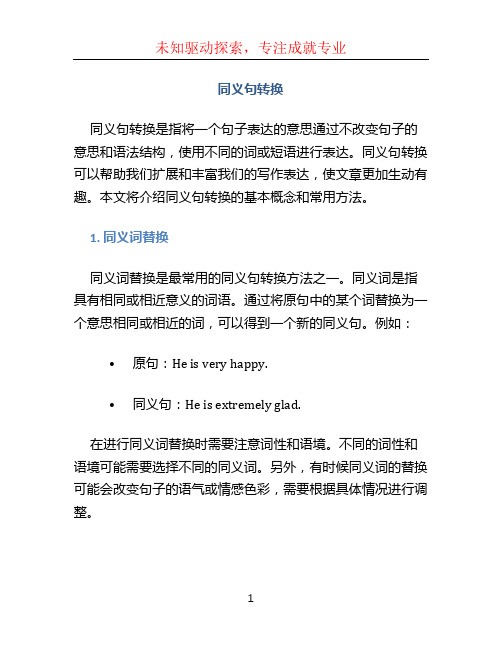
同义句转换同义句转换是指将一个句子表达的意思通过不改变句子的意思和语法结构,使用不同的词或短语进行表达。
同义句转换可以帮助我们扩展和丰富我们的写作表达,使文章更加生动有趣。
本文将介绍同义句转换的基本概念和常用方法。
1. 同义词替换同义词替换是最常用的同义句转换方法之一。
同义词是指具有相同或相近意义的词语。
通过将原句中的某个词替换为一个意思相同或相近的词,可以得到一个新的同义句。
例如:•原句:He is very happy.•同义句:He is extremely glad.在进行同义词替换时需要注意词性和语境。
不同的词性和语境可能需要选择不同的同义词。
另外,有时候同义词的替换可能会改变句子的语气或情感色彩,需要根据具体情况进行调整。
2. 反义词替换反义词替换也是一种常用的同义句转换方法。
通过将原句中的某个词替换为一个相反意义的词,可以得到一个新的同义句。
例如:•原句:He is brave.•同义句:He is cowardly.反义词替换可以使句子表达的意思完全相反,但仍然保持句子的语法结构不变。
3. 词组替换除了单个词的替换,我们还可以通过替换词组来进行同义句转换。
词组是由多个词语组合而成的固定短语,具有特定的意义。
通过将原句中的一个词组替换为一个具有相同或相近意义的词组,可以得到一个新的同义句。
例如:•原句:She is studying hard for the exam.•同义句:She is putting in a lot of effort to prepare for the test.词组替换可以使句子更加具体和生动,表达的意思更加清晰。
4. 句型转换除了词语的替换,句型的转换也是进行同义句转换的一种方法。
通过改变句子的语法结构,我们可以得到一个新的同义句。
例如:•原句:He is not only a teacher, but also a writer.•同义句:In addition to being a teacher, he is also a writer.通过句型转换,我们可以从不同的角度表达同一个意思,使句子的结构更加多样化。
小学英语PEP 同义短语总结
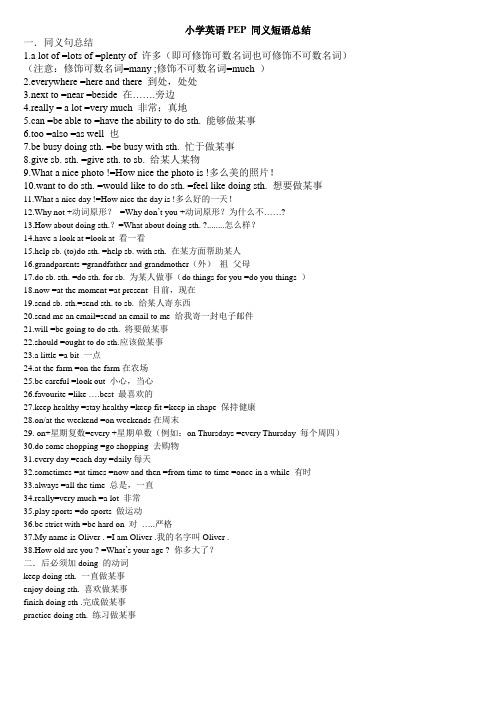
小学英语PEP 同义短语总结一.同义句总结1.a lot of =lots of =plenty of 许多(即可修饰可数名词也可修饰不可数名词)(注意:修饰可数名词=many ;修饰不可数名词=much )2.everywhere =here and there 到处,处处3.next to =near =beside 在…….旁边4.really = a lot =very much 非常;真地5.can =be able to =have the ability to do sth. 能够做某事6.too =also =as well 也7.be busy doing sth. =be busy with sth. 忙于做某事8.give sb. sth. =give sth. to sb. 给某人某物9.What a nice photo !=How nice the photo is !多么美的照片!10.want to do sth. =would like to do sth. =feel like doing sth. 想要做某事11.What a nice day !=How nice the day is !多么好的一天!12.Why not +动词原形?=Why don’t you +动词原形?为什么不……?13.How about doing sth.?=What about doing sth. ?........怎么样?14.have a look at =look at 看一看15.help sb. (to)do sth. =help sb. with sth. 在某方面帮助某人16.grandparents =grandfather and grandmother(外)祖父母17.do sb. sth. =do sth. for sb. 为某人做事(do things for you =do you things )18.now =at the moment =at present 目前,现在19.send sb. sth.=send sth. to sb. 给某人寄东西20.send me an email=send an email to me 给我寄一封电子邮件21.will =be going to do sth. 将要做某事22.should =ought to do sth.应该做某事23.a little =a bit 一点24.at the farm =on the farm在农场25.be careful =look out 小心,当心26.favourite =like ….best 最喜欢的27.keep healthy =stay healthy =keep fit =keep in shape 保持健康28.on/at the weekend =on weekends在周末29. on+星期复数=every +星期单数(例如:on Thursdays =every Thursday 每个周四)30.do some shopping =go shopping 去购物31.every day =each day =daily每天32.sometimes =at times =now and then =from time to time =once in a while 有时33.always =all the time 总是,一直34.really=very much =a lot 非常35.play sports =do sports 做运动36.be strict with =be hard on 对…..严格37.My name is Oliver . =I am Oliver .我的名字叫Oliver .38.How old are you ? =What’s your age ? 你多大了?二.后必须加doing 的动词keep doing sth. 一直做某事enjoy doing sth. 喜欢做某事finish doing sth .完成做某事practice doing sth. 练习做某事。
go to the cinema同义短语
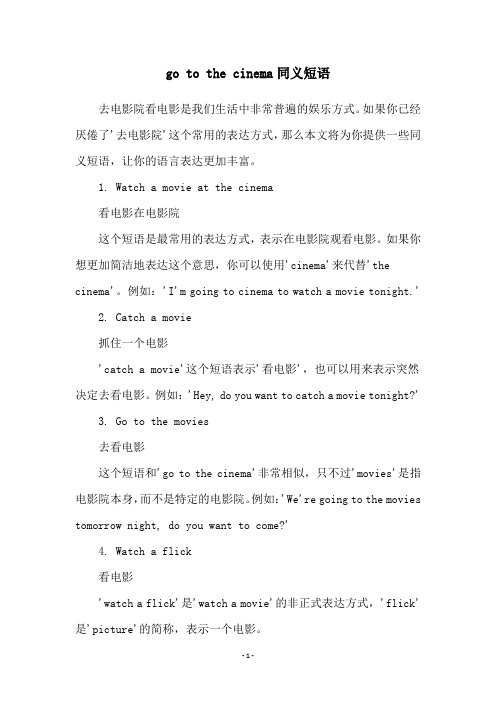
go to the cinema同义短语去电影院看电影是我们生活中非常普遍的娱乐方式。
如果你已经厌倦了'去电影院'这个常用的表达方式,那么本文将为你提供一些同义短语,让你的语言表达更加丰富。
1. Watch a movie at the cinema看电影在电影院这个短语是最常用的表达方式,表示在电影院观看电影。
如果你想更加简洁地表达这个意思,你可以使用'cinema'来代替'the cinema'。
例如:'I'm going to cinema to watch a movie tonight.' 2. Catch a movie抓住一个电影'catch a movie'这个短语表示'看电影',也可以用来表示突然决定去看电影。
例如:'Hey, do you want to catch a movie tonight?' 3. Go to the movies去看电影这个短语和'go to the cinema'非常相似,只不过'movies'是指电影院本身,而不是特定的电影院。
例如:'We're going to the movies tomorrow night, do you want to come?'4. Watch a flick看电影'watch a flick'是'watch a movie'的非正式表达方式,'flick'是'picture'的简称,表示一个电影。
5. See a film看电影'see a film'这个短语更强调电影本身,而不是电影院的环境。
它也可以用来指比较文艺或者艺术性较强的电影。
例如:'We're planning to see a film at the independent cinema this weekend.' 6. Check out a movie看电影'check out'通常表示'看看','check out a movie'的意思就是'出去看看电影'。
ihave的同义句
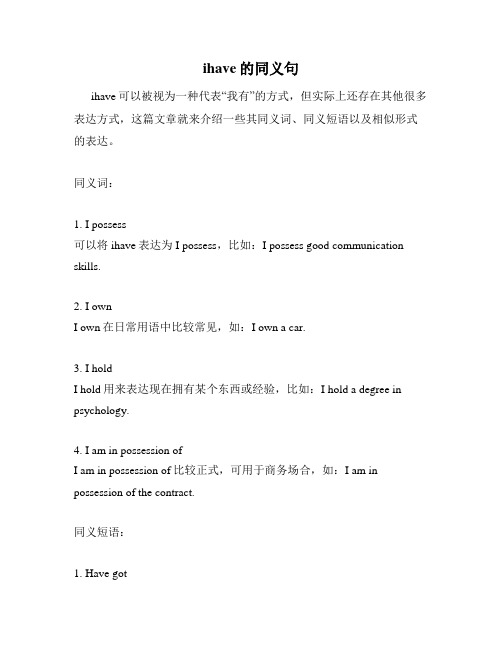
ihave的同义句ihave可以被视为一种代表“我有”的方式,但实际上还存在其他很多表达方式,这篇文章就来介绍一些其同义词、同义短语以及相似形式的表达。
同义词:1. I possess可以将ihave表达为I possess,比如:I possess good communication skills.2. I ownI own在日常用语中比较常见,如:I own a car.3. I holdI hold用来表达现在拥有某个东西或经验,比如:I hold a degree in psychology.4. I am in possession ofI am in possession of比较正式,可用于商务场合,如:I am in possession of the contract.同义短语:1. Have gotHave got是英国英语中很普遍的说法,可以替换成ihave,如:I have got a headache.2. Have obtainHave obtain也可用来表达“获得”或“拥有”,比如:I have obtained the key to the room.3. Be in possession ofBe in possession of和前面提到的I am in possession of类似,比如:I am currently in possession of the company's confidential documents.相似形式:1. I am equipped withI am equipped with可以用来描述某个人具备的能力或特质,如:I am equipped with strong analytical skills.2. I containI contain比较适用于描述物品,如:This bottle contains 500ml of water.3. I harborI harbor可用于描述某种情感或感觉,如:I harbor a deep admiration for your work.4. I exhibitI exhibit可用于形容某种展现或表现,如:I exhibit great self-control intimes of stress.总结:以上列出的同义词、同义短语以及相似形式都可以替代ihave这一表达方式,但具体使用到哪种方式还需要看具体情况。
do a good job的同义短语
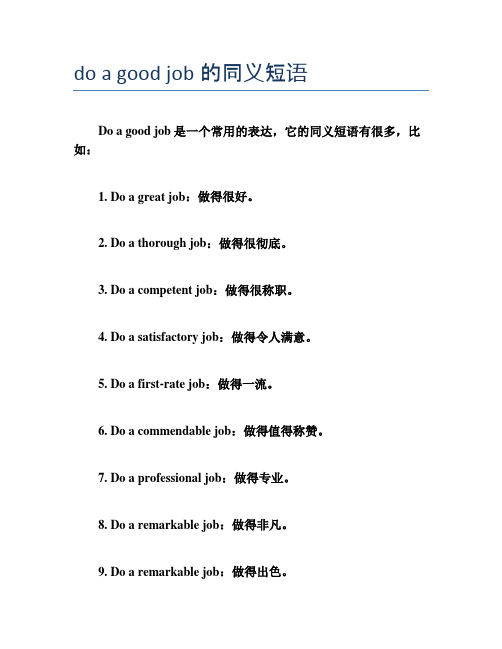
do a good job的同义短语Do a good job是一个常用的表达,它的同义短语有很多,比如:1. Do a great job:做得很好。
2. Do a thorough job:做得很彻底。
3. Do a competent job:做得很称职。
4. Do a satisfactory job:做得令人满意。
5. Do a first-rate job:做得一流。
6. Do a commendable job:做得值得称赞。
7. Do a professional job:做得专业。
8. Do a remarkable job:做得非凡。
9. Do a remarkable job:做得出色。
10. Do a top-notch job:做得极好。
11. Do a superb job:做得极佳。
12. Do a masterful job:做得精湛。
13. Do a brilliant job:做得出色。
14. Do a terrific job:做得棒极了。
15. Do a wonderful job:做得很棒。
16. Do a remarkable job:做得非凡。
17. Do a fantastic job:做得极好。
18. Do a remarkable job:做得出色。
19. Do a great job:做得很棒。
20. Do a superb job:做得极佳。
以上就是关于“do a good job”的同义短语,它们都可以用来表达“做得很好”的意思。
这些短语可以帮助我们更好地表达自己的想法,更好地表达自己的态度,更好地表达自己的观点。
be careful同义句
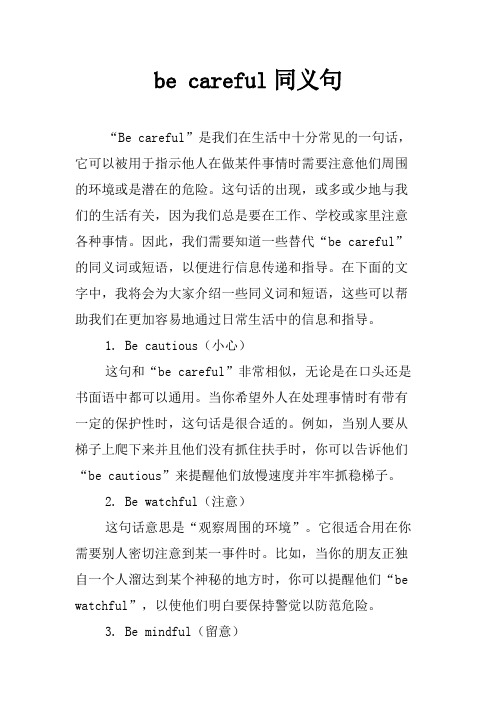
be careful同义句“Be careful”是我们在生活中十分常见的一句话,它可以被用于指示他人在做某件事情时需要注意他们周围的环境或是潜在的危险。
这句话的出现,或多或少地与我们的生活有关,因为我们总是要在工作、学校或家里注意各种事情。
因此,我们需要知道一些替代“be careful”的同义词或短语,以便进行信息传递和指导。
在下面的文字中,我将会为大家介绍一些同义词和短语,这些可以帮助我们在更加容易地通过日常生活中的信息和指导。
1. Be cautious(小心)这句和“be careful”非常相似,无论是在口头还是书面语中都可以通用。
当你希望外人在处理事情时有带有一定的保护性时,这句话是很合适的。
例如,当别人要从梯子上爬下来并且他们没有抓住扶手时,你可以告诉他们“be cautious”来提醒他们放慢速度并牢牢抓稳梯子。
2. Be watchful(注意)这句话意思是“观察周围的环境”。
它很适合用在你需要别人密切注意到某一事件时。
比如,当你的朋友正独自一个人溜达到某个神秘的地方时,你可以提醒他们“be watchful”,以使他们明白要保持警觉以防范危险。
3. Be mindful(留意)和“be watchful”一样,这句话与“be careful”也有许多共通点。
然而,“be mindful”侧重于对细节方面的留意,例如你需要在你的成果汇报中加入一些特定字段或你需要注意某些仓库项目的更新或修改。
即使看似细微,仍可以让你的工作体现出更加出色的质量。
因此,“be mindful”可以让外人明白他们需要时刻意识到有些看似不必要的小事物也非常重要。
4. Be alert(警觉)与“be watchful”和“be cautious”不同,这句话是针对外人的警觉或警示,以防止某些危险或不必要的事情。
当你希望别人的注意力尽可能地集中时,例如他们要驾车行驶或是开展某个高危工作时,提醒他们“be alert”显然是很有必要的。
英语同义句转换的名词解释
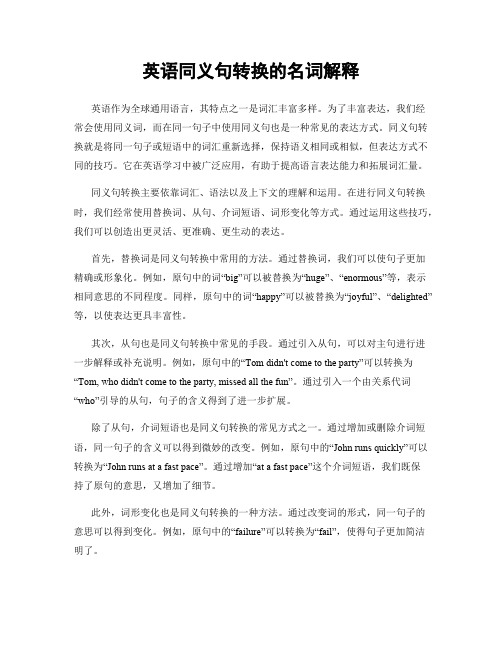
英语同义句转换的名词解释英语作为全球通用语言,其特点之一是词汇丰富多样。
为了丰富表达,我们经常会使用同义词,而在同一句子中使用同义句也是一种常见的表达方式。
同义句转换就是将同一句子或短语中的词汇重新选择,保持语义相同或相似,但表达方式不同的技巧。
它在英语学习中被广泛应用,有助于提高语言表达能力和拓展词汇量。
同义句转换主要依靠词汇、语法以及上下文的理解和运用。
在进行同义句转换时,我们经常使用替换词、从句、介词短语、词形变化等方式。
通过运用这些技巧,我们可以创造出更灵活、更准确、更生动的表达。
首先,替换词是同义句转换中常用的方法。
通过替换词,我们可以使句子更加精确或形象化。
例如,原句中的词“big”可以被替换为“huge”、“enormous”等,表示相同意思的不同程度。
同样,原句中的词“happy”可以被替换为“joyful”、“delighted”等,以使表达更具丰富性。
其次,从句也是同义句转换中常见的手段。
通过引入从句,可以对主句进行进一步解释或补充说明。
例如,原句中的“Tom didn't come to the party”可以转换为“Tom, who didn't come to the party, missed all the fun”。
通过引入一个由关系代词“who”引导的从句,句子的含义得到了进一步扩展。
除了从句,介词短语也是同义句转换的常见方式之一。
通过增加或删除介词短语,同一句子的含义可以得到微妙的改变。
例如,原句中的“John runs quickly”可以转换为“John runs at a fast pace”。
通过增加“at a fast pace”这个介词短语,我们既保持了原句的意思,又增加了细节。
此外,词形变化也是同义句转换的一种方法。
通过改变词的形式,同一句子的意思可以得到变化。
例如,原句中的“failure”可以转换为“fail”,使得句子更加简洁明了。
初中英语语法--句型转换之同义句
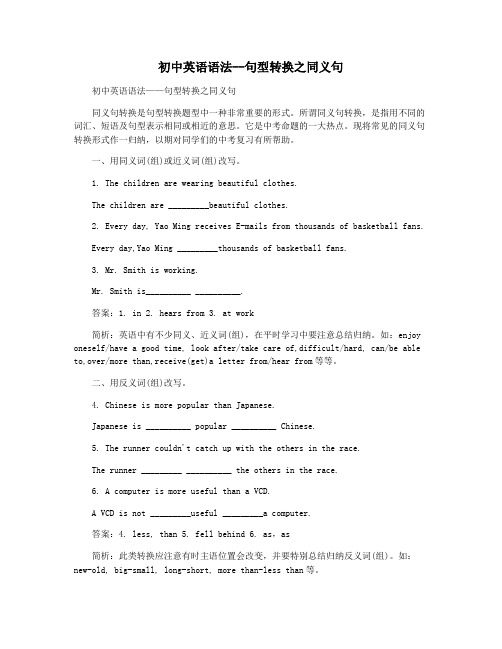
初中英语语法--句型转换之同义句初中英语语法——句型转换之同义句同义句转换是句型转换题型中一种非常重要的形式。
所谓同义句转换,是指用不同的词汇、短语及句型表示相同或相近的意思。
它是中考命题的一大热点。
现将常见的同义句转换形式作一归纳,以期对同学们的中考复习有所帮助。
一、用同义词(组)或近义词(组)改写。
1. The children are wearing beautiful clothes.The children are _________beautiful clothes.2. Every day, Yao Ming receives E-mails from thousands of basketball fans.Every day,Yao Ming _________thousands of basketball fans.3. Mr. Smith is working.Mr. Smith is__________ __________.答案:1. in 2. hears from 3. at work简析:英语中有不少同义、近义词(组),在平时学习中要注意总结归纳。
如:enjoy oneself/have a good time, look after/take care of,difficult/hard, can/be able to,over/more than,receive(get)a letter from/hear from等等。
二、用反义词(组)改写。
4. Chinese is more popular than Japanese.Japanese is __________ popular __________ Chinese.5. The runner couldn't catch up with the others in the race.The runner _________ __________ the others in the race.6. A computer is more useful than a VCD.A VCD is not _________useful _________a computer.答案:4. less, than 5. fell behind 6. as,as简析:此类转换应注意有时主语位置会改变,并要特别总结归纳反义词(组)。
- 1、下载文档前请自行甄别文档内容的完整性,平台不提供额外的编辑、内容补充、找答案等附加服务。
- 2、"仅部分预览"的文档,不可在线预览部分如存在完整性等问题,可反馈申请退款(可完整预览的文档不适用该条件!)。
- 3、如文档侵犯您的权益,请联系客服反馈,我们会尽快为您处理(人工客服工作时间:9:00-18:30)。
初中英语同义词=词组=句子转换,单选、完形、写作都能用到
一、同义词互相转换
1 alone=by oneself
2 actually=in fact
3 also=too=as well
4 another=one more
5 arrive in(at)==get to=reach
6 maybe=perhaps=may be
7 continue=go on 8 cost=spend=take=pay
9 cross=go across 10 sometimes=at times
11 die=lose one’s life 12 now=at the moment
13 else=other 14 then=at that moment=at that time
15 like=love=enjoy=be fond of=be interested in=care for
16 will=be going to=be about to 17 want=would like 18
can=be able to=have the ability to do
19 visit=call on 20 favorite=like best
21 happen=take place 22 decide=make a decision=make up one’s mind
23 found=establish=set up 24 finally=at last=in the end
25 leave=be away 26 return=give back
27 why=what for=how come 28 over=more than
29 whatever=no matter what 30 whenever=no matter when
31 walk= go…on foot 32 should=ought to=be supposed to
33 population=people 34 quit=stop=drop=give up
二、同义词组互相转换
1 a lot of=lots of
2 all over the world=around the world
3 not as(so)…as=less than
4 as…as possible=as…as sb can
5 at risk=in danger=in trouble
6 at the age of…=when
sb.+be+…years old
7 because of=due to=as a result of=with one’s help=thanks to
8 be careful=look out=take care 9 be worried about=worry about
10 both…and…=not only…but also…11 be good at=do well in
12 be proud of=take pride in 13 come up with=think of=have an idea
14 ride a bike=go…by bike 15 come from=be from
16 have a good time=enjoy oneself=play happily
17 have a pain in head=have a headache 18 hear from=receive(get) a letter from
19 had better do=It’s best to do
20 how about=what about 21 in order to=in order that=to do=so that
22 keep off=keep away from 23 in=wear She is in=wearing a white dress today.
24long, long ago=once upon a time 25 learn …by oneself= teach oneself 26 no longer=not …any longer 27 shall we=Let’s..
28 look after well=take good care of 29 take part in=join in=participate in
30 too…to=so…that…=enough to…
31 like …better than=prefer…to…=prefer to do…rather than do…
32 keep sb. from doing=stop sb. (from) doing=prevent sb. (from) doing
三、同义句型互相转换
1 运用两种时态(一般过去时和现在完成时互相转换)
(1) He left last year.
(2) He has been away for one year.
(3) He has been away since a year ago.
(4) It is a year since he left.
(5) One year has passed since he left.
2 最高级和比较级的互相转换
(1) He is the tallest student in his class.
(2) He is taller than any other student in his class.
(3) He is taller than the other students in his class.
(4) No one else is taller than him in his class.
3 运用两种语态(主动语态和被动语态互相转换)
I clean my room every day.=My room is cleaned every day.
4 感叹句的两种句型之间互相转换
What a careful girl she is!=How careful the girl is!
5 运用关联词语合并句子
(1) Amy can’t dance. Susan can’t,either. Neither Amy nor Susan can dance.
(2) I has eaten breakfast and my mother has eaten it, too. Both my mother and I have eaten breakfast.
6 运用复合句和不定式互相转换
(1) I hope that I can visit the moon one day.=I hope to visit the moon one day.
(2) He told me how he could use a computer.=He told me how to use a computer.
7 运用不同的句式结构互相转换
(1) She wants to go shopping and her friends want to go shopping, too.
=She wants to go shopping, and so do her friends.
(2) He went to bed after he finished his homework.
=He went to bed after finishing his homework.
=He didn’t go to bed until he finished his homework.
(3) Come on, or we’ll miss the early bus.=If we don’t hurry, we’ll miss the early bus.
(4) The man gave us a talk last week, and he will give us another talk this week.
=The man who gave us a talk last week will give us another talk this week.
8 用it做形式主语互相转换
(1) He can finish the work easily.=It is easy for him to finish the work.
(2) We found it hard to shake.=We found it was hard to skate.。
